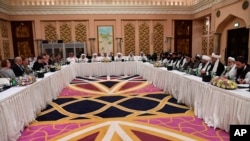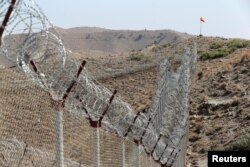The United States is scheduled to hold another round of meetings with the Taliban this month in Qatar in a fresh bid to end the deadlock in peace talks with the Afghan insurgent group while reaching out to regional stakeholders, including Pakistan, for assistance.
The direct dialogue between the two adversaries began nearly a year ago and has achieved noteworthy progress toward ending the nearly 18-year war in Afghanistan. The process has, however, stalled lately over the Taliban’s demand for all American troops to withdraw from the country before it stops fighting and participates in peace negotiations among Afghans.
Washington wants a final deal that covers all the elements before it announces a military drawdown timetable.
Ahead of his talks with insurgent interlocutors in the Qatari capital of Doha, chief American negotiator Zalmay Khalilzad traveled Sunday to Islamabad, where he discussed what Pakistan can do to help advance the Afghan peace process, the envoy noted in a post-visit tweet. He did not elaborate.
In comments to VOA, sources privy to Khalilzad’s discussions in Islamabad said, “Since the peace process is practically stalemated, he [Ambassador Khalilzad] wants everyone including Pakistan to urge [the] Taliban to demonstrate more flexibility.”
As usual, said the source, Washington has “greater expectations from Pakistan but they now realize that Pakistan had no control over the Taliban.”
A Pakistani Foreign Ministry spokesman, in a statement issued after Sunday’s talks with Khalilzad, said Islamabad reiterated its commitment for Afghan peace, encouraging "all sides to seize the moment to end the prolonged conflict through a political settlement."
Islamabad takes credit for arranging the ongoing U.S.-Taliban dialogue and had stressed at the outset that achieving desired outcomes would be entirely up to the two negotiating sides. “We have led the horse to water but we can’t make it drink,” said a senior Pakistani official while speaking to VOA at the time.
Stalemate in talks troubles Pakistan
Pakistani leaders also appear uneasy over the lack of progress in the U.S.-led Afghan peace process, and say they are preparing themselves to deal with all eventualities, including no peace deal between the warring sides.
“While Pakistan continues to play its positive role toward success of an Afghan reconciliation process and peace in the region, we also stay ready for any unforeseen eventuality,” the Pakistani military chief said during a recent visit to troops on forward posts along the Afghan border.
“For this, Pakistan is solidifying border through fencing, construction of new forts and posts and increase in strength of [paramilitary] Frontier Corps troops to effectively manage the border,” noted General Qamar Javed Bajwa.
A military-led massive effort is currently under way to install a robust fence along most of the 2,600-kilometer traditionally porous Afghan frontier. The project is expected to be completed by the end of 2019.
Afghanistan and Pakistan routinely accuse each other of supporting and allowing anti-state militants to orchestrate terrorist attacks against their respective soils.
Officials in Pakistan say the border security plan would effectively prevent illegal movement in both directions, addressing mutual concerns and easing tensions between Islamabad and Kabul.
Pakistan, which still hosts nearly 3 million Afghan refugees, was one of the three countries that had recognized the Taliban government in Afghanistan before it was ousted by a U.S.-led military invasion in the aftermath of the 9/11 terrorist strikes against the United States in 2001.
Taliban leaders have since allegedly used Pakistani sanctuaries to orchestrate insurgent attacks, charges Islamabad rejects, although it does not rule out the possibility of insurgents using Afghan refugee populations as hiding places.











